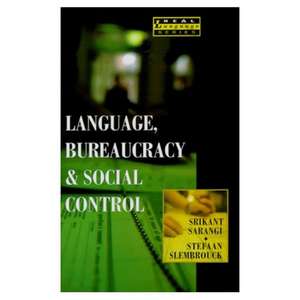Language, Bureaucracy and Social Control: Real Language Series
Autor Srikant Sarangi, Stefan Slembroucken Limba Engleză Paperback – 22 aug 1996
| Toate formatele și edițiile | Preț | Express |
|---|---|---|
| Paperback (1) | 461.03 lei 43-57 zile | |
| Taylor & Francis – 22 aug 1996 | 461.03 lei 43-57 zile | |
| Hardback (1) | 1108.89 lei 43-57 zile | |
| Taylor & Francis – 9 feb 2015 | 1108.89 lei 43-57 zile |
Preț: 461.03 lei
Preț vechi: 542.39 lei
-15% Nou
Puncte Express: 692
Preț estimativ în valută:
88.22€ • 92.35$ • 72.99£
88.22€ • 92.35$ • 72.99£
Carte tipărită la comandă
Livrare economică 07-21 aprilie
Preluare comenzi: 021 569.72.76
Specificații
ISBN-13: 9780582086227
ISBN-10: 0582086221
Pagini: 256
Dimensiuni: 138 x 216 x 14 mm
Greutate: 0.45 kg
Ediția:1
Editura: Taylor & Francis
Colecția Routledge
Seria Real Language Series
Locul publicării:Oxford, United Kingdom
ISBN-10: 0582086221
Pagini: 256
Dimensiuni: 138 x 216 x 14 mm
Greutate: 0.45 kg
Ediția:1
Editura: Taylor & Francis
Colecția Routledge
Seria Real Language Series
Locul publicării:Oxford, United Kingdom
Cuprins
Foreword
Acknowledgements
1. Language, bureaucracy and social control
Bureaucracy
Bureacracy and social control
Language and bureaucracy
Synopsis
2. Bureaucratisation and debureaucratisation in contemporary society
Introduction: what discourse practices are construed as bureaucratic?
Bureaucratisation and debureaucratisation
Changing discourse practices as action and as process
The analysis of language use
The language-situation dynamic
Social control as an area of struggle
Conclusion
3. The pragmatics of information exchange in bureaucratic discourse
Introduction: information exchange as a focus of study
Bureaucrats seeking information and clients giving it
Interpreting information exchange in pragmatic terms
Reversing the roles: clients seeking information and institutions avoiding giving information
Conclusion: regulated information exchange and social control
4. Role behaviour in discourse
Introduction
Modes of talk and multiple role behaviour
Discourse roles
Shifting role relationships and the construction of social identities
Role perception in discourse
Conclusion
5. The client's perspective: clients as citizens
Introduction
Challenging the inhuman face of bureaucracy
Creating an edge over the institution
Talking to bureaucrats in order to maintain non-clienthood
Client's response to institutional failure: the case of lost mail
Conclusion
6. The bureaucrat's perspective: citizens as clients
Introduction
Alarming the client
Maintaining bureaucracy through official documents: forms and leaflets
Conclusion
7. The discourse of mediation: bureaucrats' dilemma and clients' wisdom
Introduction
Social workers attemting to redress the imbalance
Counselling institutions
Institutional monopolies over mediation
Conclusion: socio-economic struggles over multi-tier bureaucracy
8. Instead of a conclusion
Bibliography
Appendices
Index
Acknowledgements
1. Language, bureaucracy and social control
Bureaucracy
Bureacracy and social control
Language and bureaucracy
Synopsis
2. Bureaucratisation and debureaucratisation in contemporary society
Introduction: what discourse practices are construed as bureaucratic?
Bureaucratisation and debureaucratisation
Changing discourse practices as action and as process
The analysis of language use
The language-situation dynamic
Social control as an area of struggle
Conclusion
3. The pragmatics of information exchange in bureaucratic discourse
Introduction: information exchange as a focus of study
Bureaucrats seeking information and clients giving it
Interpreting information exchange in pragmatic terms
Reversing the roles: clients seeking information and institutions avoiding giving information
Conclusion: regulated information exchange and social control
4. Role behaviour in discourse
Introduction
Modes of talk and multiple role behaviour
Discourse roles
Shifting role relationships and the construction of social identities
Role perception in discourse
Conclusion
5. The client's perspective: clients as citizens
Introduction
Challenging the inhuman face of bureaucracy
Creating an edge over the institution
Talking to bureaucrats in order to maintain non-clienthood
Client's response to institutional failure: the case of lost mail
Conclusion
6. The bureaucrat's perspective: citizens as clients
Introduction
Alarming the client
Maintaining bureaucracy through official documents: forms and leaflets
Conclusion
7. The discourse of mediation: bureaucrats' dilemma and clients' wisdom
Introduction
Social workers attemting to redress the imbalance
Counselling institutions
Institutional monopolies over mediation
Conclusion: socio-economic struggles over multi-tier bureaucracy
8. Instead of a conclusion
Bibliography
Appendices
Index
Notă biografică
Authored by Sarangi, Srikant; Slembrouck, Stefan






















